January 25, 2026
Updated: February 8, 2026
An independent, criteria-driven ranking of the world’s best pentesting firms for enterprises and SMBs.
Mohammed Khalil
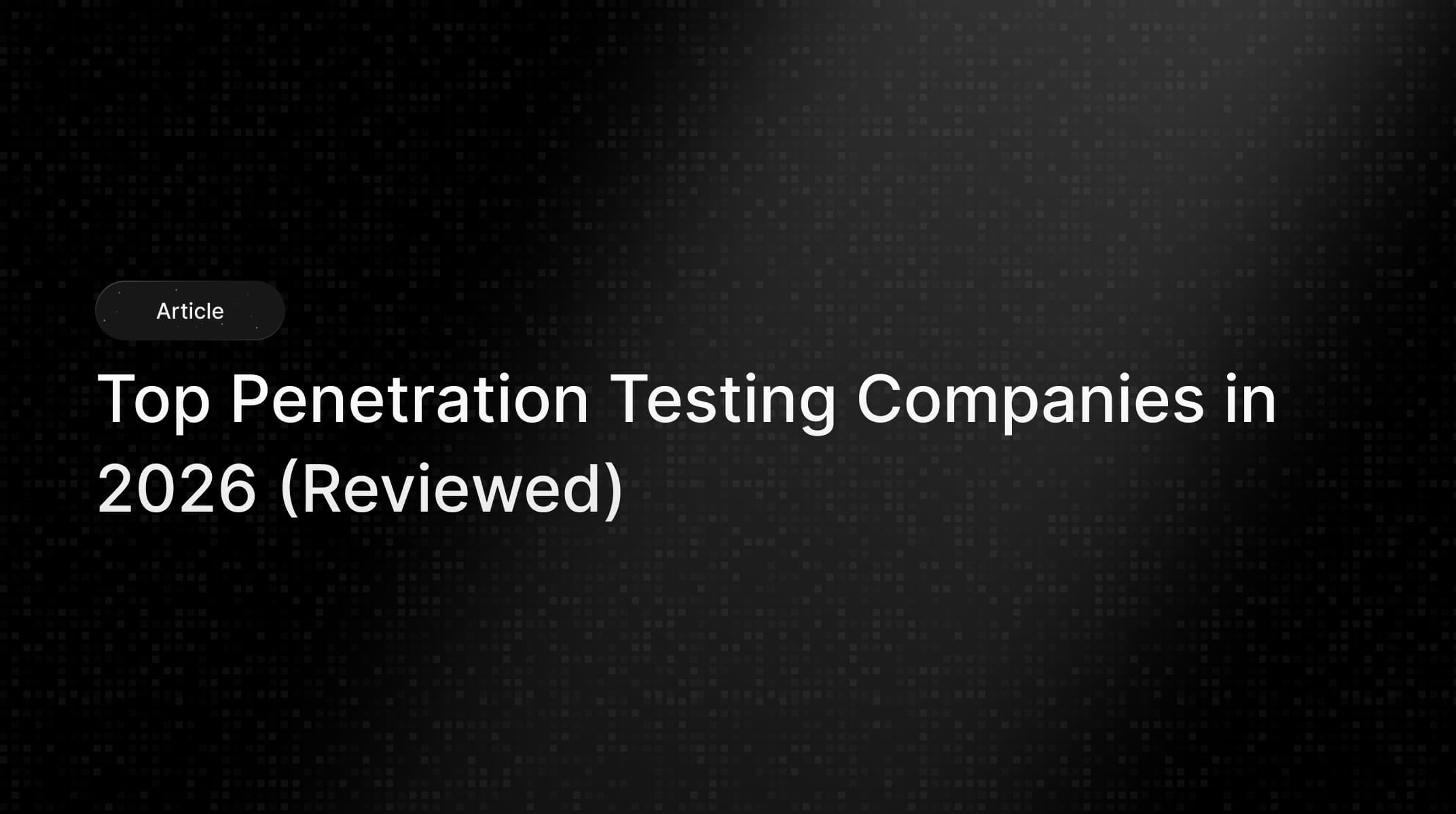
Choosing the right penetration testing provider can make or break your security program in 2026. Today’s threat landscape is more sophisticated and AI driven than ever from automated phishing to infostealer driven password harvesting and organizations face relentless compliance pressures to demonstrate security diligence. A capable pentesting firm doesn’t just check a box; it helps validate your defenses against real world attacks. This independent, research driven ranking of top pen testing companies worldwide aims to give you an unbiased look at leading providers, so you can shortlist vendors with confidence.
Why does the choice matter so much now? Cyber threats continue to escalate, and security budgets are rising accordingly. 92% of organizations increased their cybersecurity spending last year, with 85% boosting penetration testing specifically. The global pentesting market is projected to grow from $2.15 billion in 2026 to $5.0 billion by 2030 18.4% CAGR, underscoring how critical these services have become. Breaches are incredibly costly averaging $4.44 million per incident in 2026 so investing in proactive testing is a fraction of that cost. In fact, 72% of security professionals report that penetration testing has prevented a breach at their organization.
Importantly, this list is independent and criteria driven. Our rankings are based on objective evaluation detailed in the methodology below, not sponsorships or marketing hype. Whether you’re a Fortune 500 company or a tech startup, the goal is to highlight providers that consistently deliver expert, manual testing and actionable results. As you’ll see, many organizations are moving to continuous and on demand testing models over 70% have adopted Penetration Testing as a Service PTaaS with another 14% planning to. This shift reflects the need for ongoing validation rather than one off annual audits. In practice, integrating continuous security testing to catch credential abuse early can help organizations stay ahead of attackers between formal assessments.
In the sections that follow, we first explain how to approach choosing a pen testing provider and debunk common misconceptions buyers have. We then lay out how we ranked these top companies using a transparent methodology. Finally, we present the Top 10 Penetration Testing Companies Worldwide for 2026, each with an in depth profile including strengths, limitations, and ideal use cases. By the end, you’ll have a clear understanding of the leading players in this space and which might be the best fit for your organization’s needs.
Selecting a penetration testing firm is a high stakes decision. A common mistake is treating pentesting as a commodity purchase in reality, provider capabilities vary widely. Below are key considerations to guide your choice, along with red flags to watch for and what truly matters versus marketing claims:
In summary, choose a provider that demonstrates deep expertise, transparent practices, and a commitment to helping you improve, not just ticking boxes. For example, a strong partner will offer comprehensive security testing programs that validate authentication controls and other critical defenses, rather than superficially running generic scans. By focusing on what actually matters skilled people, proven methods, and actionable results you can cut through marketing noise and select a pentesting firm that truly elevates your security.
Even seasoned professionals can fall for misconceptions when evaluating pentest providers. Here are some of the most common mistakes and myths that lead to poor selection avoid these to make a smarter choice:
By recognizing these misconceptions, you can approach your comparisons with a clear head. In short: value expertise over hype, substance over size, and actionable insight over superficial metrics. The next section details the methodology we used to rank the top providers based on these principles and more.
Transparency in our evaluation process is essential. To fairly rank the top penetration testing companies worldwide in 2026, we developed a framework reflecting what real buyers care about. Each company was assessed holistically across multiple dimensions rather than a single numeric score, mirroring real world decision criteria. The key factors we evaluated include:
In applying these criteria, we weighted real world impact above all. That means a provider that might rank lower on one metric but delivers exceptional value on others could still make our top list. For example, a smaller firm without a global office network can outrank a larger one if their technical depth and client satisfaction are superior. The final ranking order is the result of balancing these factors, with an eye toward what would truly matter in a buyer’s decision process. Every company here met a baseline of excellence across multiple categories, and their specific strengths and niches informed their placement. Now, let’s dive into the rankings and see how each of the Top 10 Penetration Testing Companies in 2026 earned their spot.
Note: Company profiles are organized alphabetically by ranking order. Each profile includes key facts and an unbiased assessment of why the company stands out, as well as any limitations. All companies were evaluated using the criteria above, and the final ranking reflects a holistic judgment of their capabilities. Prices are not discussed here as they vary by project, but value and ROI are considered in the analysis.
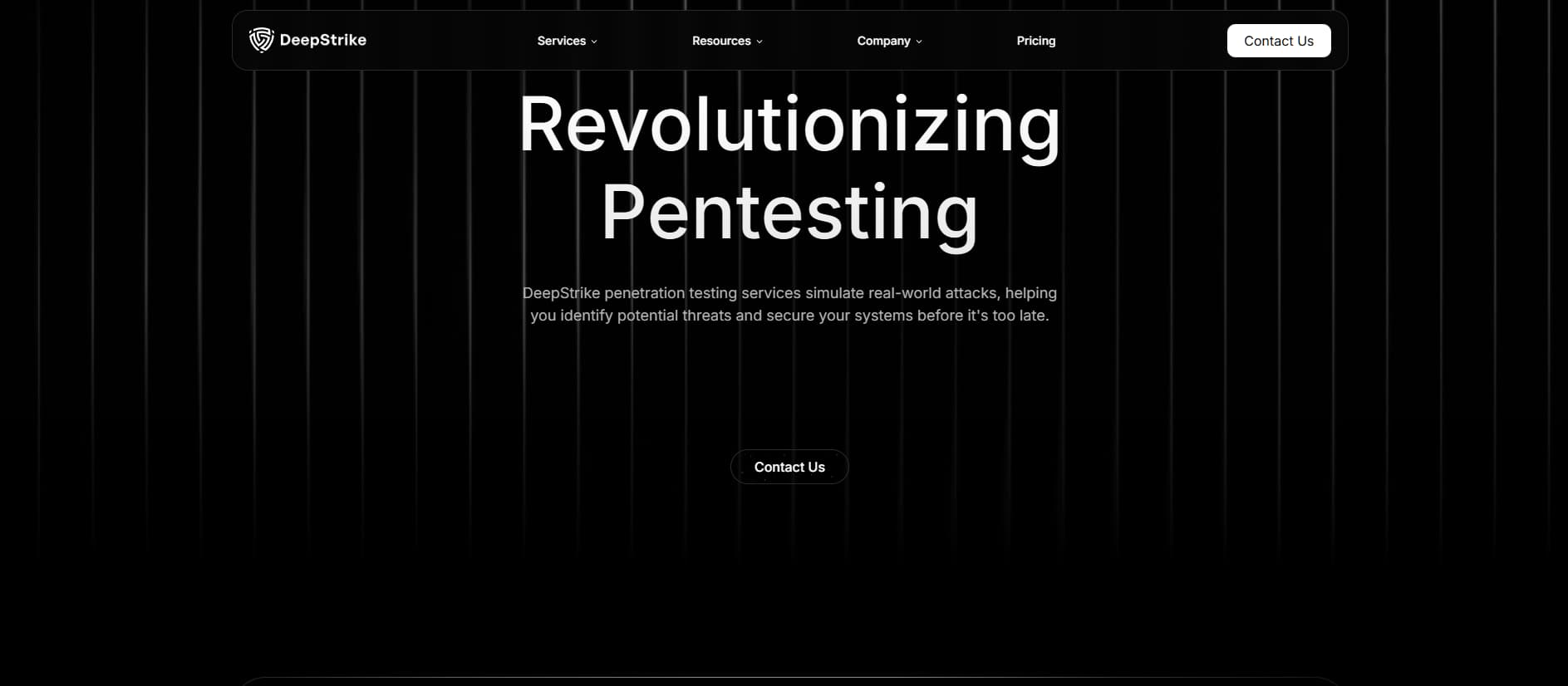
Why They Stand Out: DeepStrike earned the top spot due to its exceptional balance of technical expertise, tailored service, and innovation. The company is composed of senior ethical hackers who think like attackers but operate as trusted advisors, delivering deep manual testing rather than automated fluff. They have particular strengths in modern attack surfaces cloud platforms, APIs, and complex web applications where they employ creative techniques to uncover vulnerabilities. DeepStrike also differentiates itself with high quality, actionable reporting: their reports don’t just list issues, but map out attack chains and provide clear remediation steps, which clients consistently praise. Unlike many firms of similar size, DeepStrike has invested in a cutting edge PTaaS platform that supports continuous testing and real time result updates for clients, all while keeping human experts in the loop. This combination of advanced manual testing and supportive tooling gives clients the best of both worlds.
Key Strengths:
Potential Limitations: DeepStrike is a specialized firm and intentionally not as large as some competitors. While this is a strength in terms of focus, very large organizations that prefer a huge global brand or a provider with hundreds of consultants may perceive DeepStrike’s boutique size as a limitation. They do cover multiple time zones and have international presence, but those needing a physical office in every major country might opt for a bigger consultancy. Additionally, DeepStrike’s focus is strictly on offensive security services they do not offer broader IT consulting or managed security services. Companies seeking a one stop shop for all IT/security needs might find they need to pair DeepStrike with other vendors for ancillary services. However, for pure play penetration testing excellence, DeepStrike’s specialization is precisely what makes them the best overall choice.
Best For: Medium to large enterprises and tech forward organizations that want top tier, hands on penetration testing with a personal touch. DeepStrike is ideal for teams who value a partner that will adapt to their development cycle DevSecOps, CI/CD and provide continuous insights. It’s also well suited for compliance conscious companies that still demand deep security DeepStrike’s testing naturally satisfies PCI, SOC 2, etc., even though they focus on real security over checkbox compliance. In short, enterprises or mid size firms looking for a flexible yet highly expert pentesting provider will find DeepStrike to be the best overall fit in 2026.
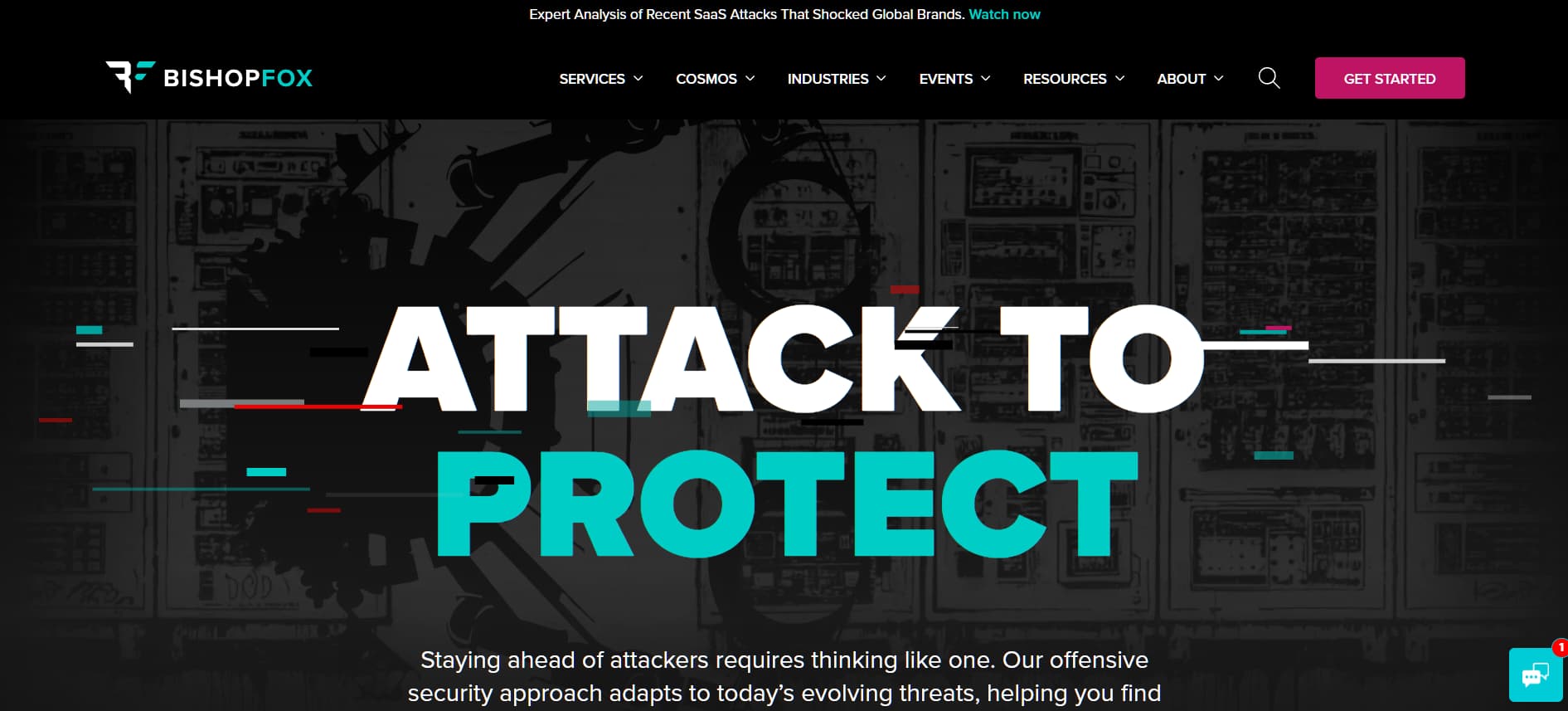
Industries Served: Broad including Fortune 500 enterprises across finance, technology, retail, and defense; known for serving large organizations and cloud first companies.
Why They Stand Out: Bishop Fox is a veteran in the security testing field and a top choice for enterprises that require scalable, continuous testing solutions. They pioneered a hybrid approach of combining traditional consulting with a technology platform. Their Cosmos continuous testing platform automates the discovery of assets and vulnerabilities across an organization’s attack surface, but critically, all findings are verified and exploited by Bishop Fox’s human experts before being reported. This gives clients an always on testing capability with the assurance of expert validation. Bishop Fox’s long history also means they have a deep bench of talent many of their testers and researchers are well known in the community for releasing tools and speaking at conferences. They have contributed to open source offensive tools like the Sliver C2 framework, reflecting strong thought leadership. For enterprises needing comprehensive coverage, Bishop Fox’s global reach and large team allow them to tackle big, complex projects such as testing hundreds of apps or extensive networks efficiently.
Key Strengths:
Potential Limitations: Being one of the larger specialized firms, Bishop Fox typically comes at a premium price. Enterprises usually find the value justifies it, but smaller organizations or those on a limited budget might find Bishop Fox’s cost out of reach for repeat testing. Additionally, as with any bigger company, the level of personalization can vary some clients might get a superstar team, while others could occasionally get less seasoned consultants for smaller projects. However, Bishop Fox’s quality control is generally strong, and they emphasize senior oversight. Another consideration: if an organization is looking for very niche expertise for example, extremely specialized ICS/SCADA hardware testing or other esoteric areas, Bishop Fox can do it, but a tiny boutique firm that lives and breathes that niche might be more laser focused. For most use cases though, Bishop Fox is a top tier choice.
Best For: Large enterprises and fast growing tech firms that need a reliable, ongoing pentesting partnership. Bishop Fox is best for organizations that want continuous attack surface management, broad expertise, and the assurance of a well established firm. If you are an enterprise CISO seeking a provider that can handle everything from yearly compliance tests to unannounced red team exercises across global offices, Bishop Fox should be on your shortlist. It’s also ideal for companies who appreciate a blend of automation and human expertise to keep up with ever changing attack surfaces.
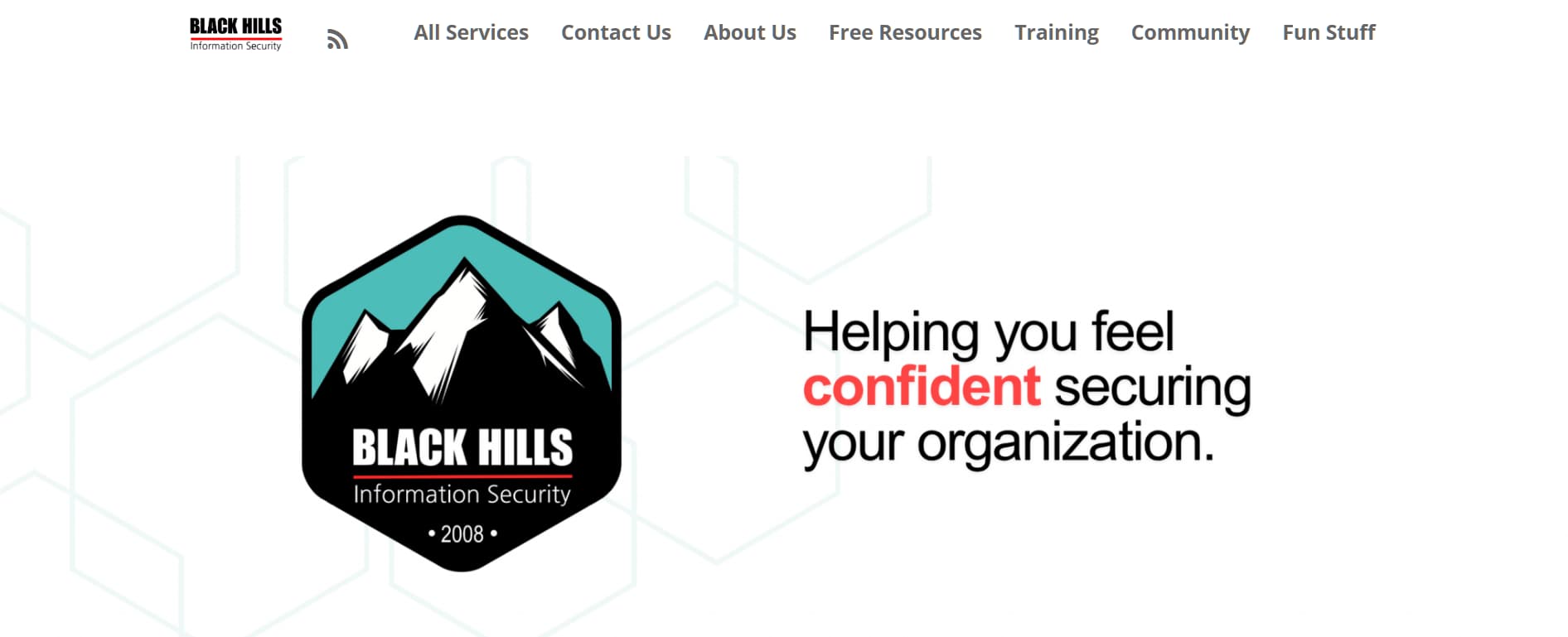
Why They Stand Out: BHIS has a distinct philosophy: Assume you’re already compromised. They approach pentesting not just as a checklist but as an interactive learning experience for the client’s team. During tests, BHIS consultants often work alongside client staff in real time, showing them how the attack is unfolding and how to detect or stop it. This collaborative style means that beyond a report, clients gain hands-on knowledge to improve their defenses long term. BHIS is also widely respected in the security community for its educational contributions they produce free webcasts, blogs, and even the Backdoors & Breaches incident response card game. Their focus on practical, real world security instead of purely compliance resonates with many engineering driven companies. Technically, BHIS is strong in network and Active Directory penetration testing, often simulating post breach scenarios to see how far an attacker could spread. While they may not have the sheer size of others, BHIS’s influence in the community and their loyal client following speak to their quality and trustworthiness.
Key Strengths:
Potential Limitations: BHIS’s model of primarily remote, collaborative testing might not appeal to every organization. For companies that prefer a very formal, traditional consulting engagement with on site presence, BHIS’s informal style could be a mismatch. Additionally, BHIS typically has a waiting list; their popularity and limited size mean you might need to book well in advance. They are selective in taking on projects to ensure quality. In terms of service range, BHIS focuses on the core pentesting and related training they may not offer some highly specialized services at the depth of other niche firms for instance, extremely specialized hardware or automotive security tests. If you need those, you might combine BHIS for general pentesting and another provider for the niche area.
Best For: Small to mid sized organizations and any security conscious team that wants more than just a test they want to learn. BHIS is perfect for companies that view a pentest as an opportunity to train their internal staff and improve processes, not just get a report for compliance. They are an excellent choice for businesses that might not have a huge security budget but refuse to compromise on getting a quality, manual pentest. Enterprises with mature teams also use BHIS for purple team engagements to sharpen their defenses. If you value a partner who is down to earth, education oriented, and deeply technical, Black Hills Information Security is a top pick.
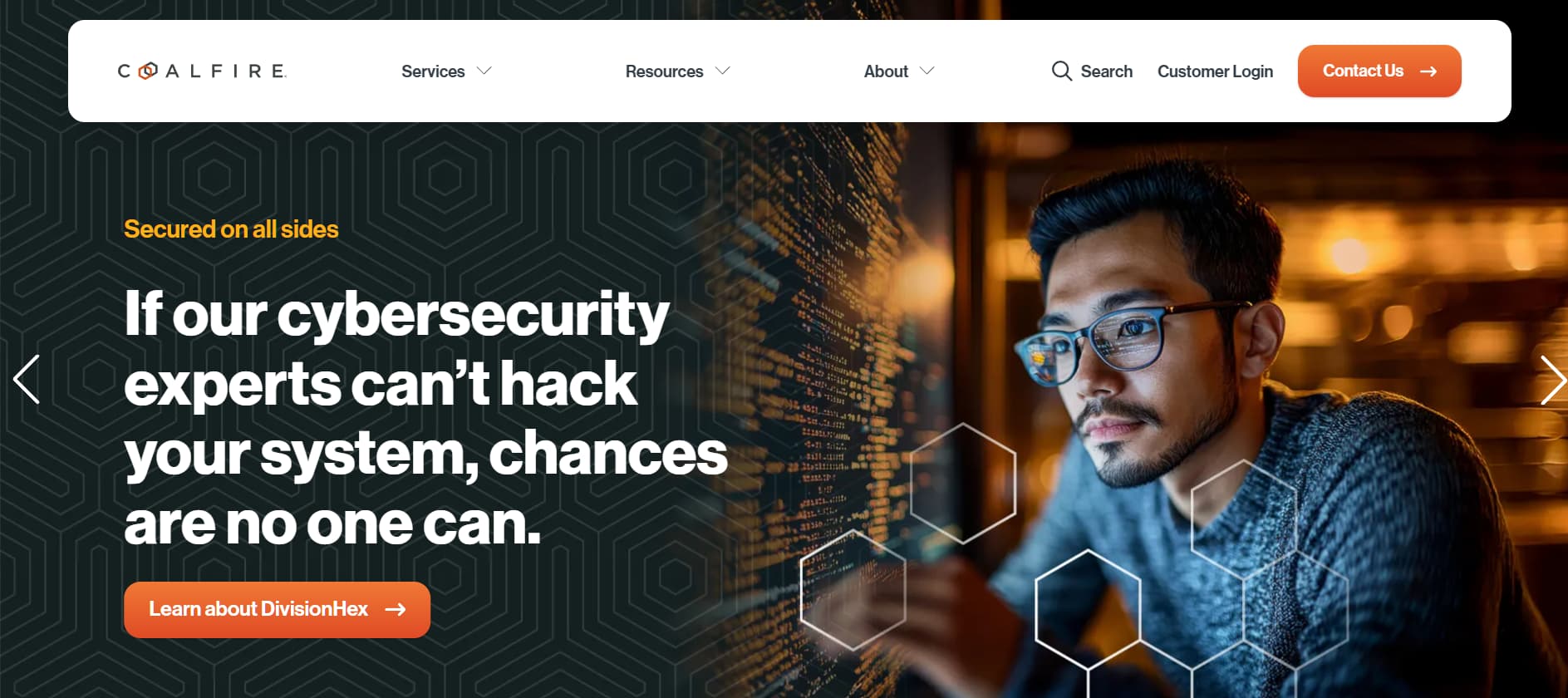
Why They Stand Out: Coalfire is unique on this list as both a top penetration testing provider and a leading compliance assessor. They have a dual reputation: one arm works on audits and advisory, while Coalfire Labs their offensive security team handles pentesting. This makes Coalfire extremely valuable for organizations that want security testing aligned tightly with compliance goals. For example, Coalfire is a widely recognized FedRAMP 3PAO Third Party Assessment Organization, meaning they are authorized to conduct penetration tests and security assessments for cloud providers seeking FedRAMP certification. They understand how to test cloud environments not only for security, but also to satisfy stringent government requirements. Similarly, they have deep expertise in PCI, HIPAA, and other standards their pentesters know how to map findings to these frameworks. Coalfire also has a strong cloud security focus; they frequently test AWS, Azure, and Google Cloud deployments and can offer guidance on cloud architecture hardening. While some compliance oriented firms get a bad rap for being superficial, Coalfire Labs is respected for its technical rigor combined with compliance insight. They strive to deliver real security value finding true vulnerabilities while also producing the documentation needed for audits.
Key Strengths:
Potential Limitations: Organizations purely interested in the most creative or unbounded offensive security tests like those more akin to real world nation state simulations might find Coalfire a bit more structured due to their compliance orientation. Their engagements tend to be well scoped and according to plan which is often positive for predictability. But if you wanted a very freestyle, no holds barred red team, a niche firm might push further into unconventional territory. Additionally, Coalfire’s pricing can be on the higher side, reflecting their enterprise focus and dual value in compliance. If you don’t need any compliance considerations, you might be paying a premium for expertise you won’t fully utilize. Lastly, as a large company, the personal touch can vary. Some clients will get very hands-on attention, while others might feel like just another project this often depends on the project manager and team assigned.
Best For: Regulated companies and cloud first organizations that want a trusted partner to satisfy both security and compliance. If you are a cloud service provider needing a pentest for FedRAMP or a bank preparing for a PCI audit, Coalfire is an excellent choice. They are best for medium to large enterprises that value structured testing, clear documentation, and perhaps have to report results to regulatory bodies or customers. Coalfire is also a strong fit for any organization that uses modern cloud infrastructure and wants that tested by people who deeply understand cloud and container technologies. In summary, choose Coalfire if you need offensive security expertise with a compliance lens they will ensure you are both secure and audit ready.
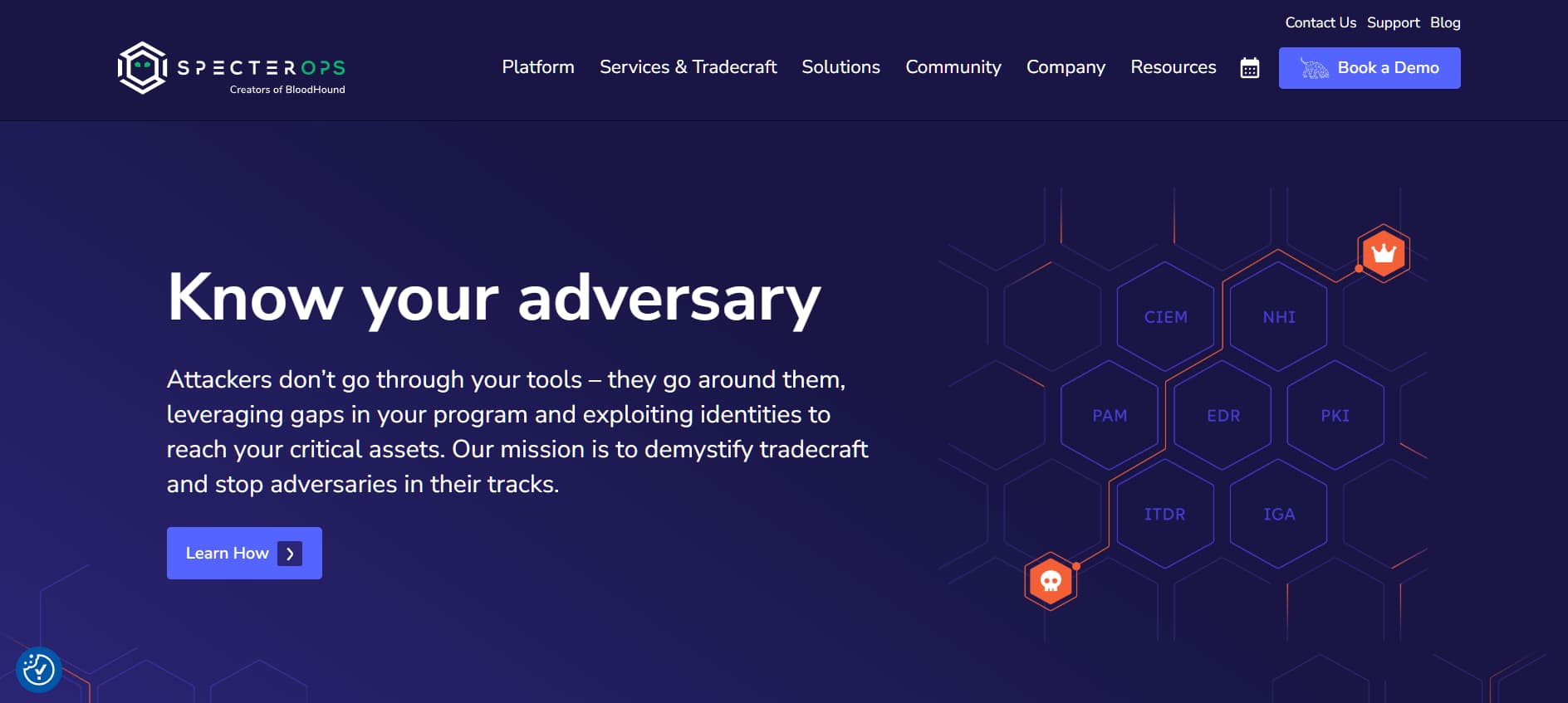
Why They Stand Out: SpecterOps is synonymous with cutting edge adversary simulation. Many of its team members are former government and military cyber operators including ex NSA Red Team leads, which gives them insight into real advanced persistent threat APT techniques. They famously created BloodHound, the open source tool for mapping Active Directory attack paths used by thousands of security teams worldwide. This focus on identity and Active Directory/Azure AD security is a major differentiator SpecterOps can reveal how a hacker could exploit subtle misconfigurations in AD to escalate privileges and own an entire domain, a critical scenario for any enterprise relying on Microsoft identity platforms. They also received CREST accreditation for pentesting and even achieved FedRAMP High authorization for their BloodHound Enterprise product, underscoring their credibility. SpecterOps engagements are known to be very realistic: they don’t just scan for vulnerabilities, they emulate specific threat actors and attempt goal oriented scenarios e.g., stealthily gain access to sensitive data. For organizations looking to test their detection and response as much as their prevention, SpecterOps provides that true challenge.
Key Strengths:
Potential Limitations: SpecterOps is highly specialized. If you are looking for more basic pentesting e.g., a routine web app test for a simple app, they might be overkill and likely pricier than necessary for that use case. Their availability can also be limited; top specialists like SpecterOps tend to be booked far in advance for large engagements. Another consideration is that they may pull no punches for organizations not prepared for an aggressive red team, it can be a humbling experience which is the point, but stakeholders should be ready for it. SpecterOps also does not market themselves as a general we do everything firm they focus on what they do best offense and training. If a client needs broader security consulting or managed services, they’d need to pair SpecterOps with others. Finally, because SpecterOps often works with very security mature clients, less mature organizations might find some of their findings difficult to understand or address without additional help SpecterOps will tell you the hard truth about your vulnerabilities, which is great, but ensure you have a plan to act on it.
Best For: Enterprises with advanced security programs or those who know they need to be tested against the worst case scenarios. SpecterOps is the right choice when you want to simulate top tier adversaries APT groups or thoroughly vet your identity and access management security. It’s best for organizations that have already handled the basics patching, basic pentests and now want to dig deeper into sophisticated attack vectors. Industries like banking, defense, large tech, or any company that suspects it could be targeted by state level threats would benefit immensely from SpecterOps’ services. Also, if you specifically worry about Active Directory/Azure AD weaknesses and you should, if you use them, SpecterOps is the premier expert to call.
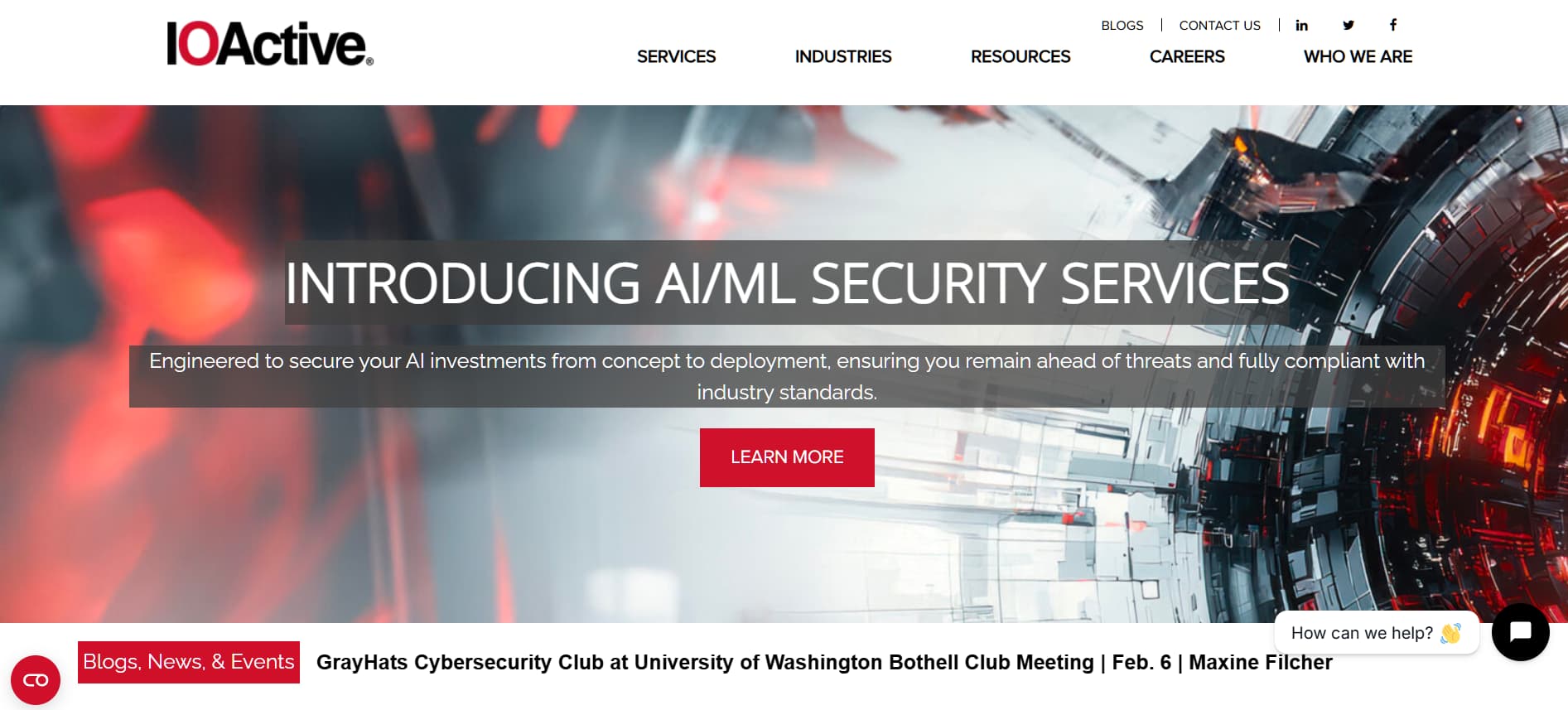
Why They Stand Out: IOActive is a pioneer in the field of hardware and device penetration testing. While they do offer conventional pentesting, their claim to fame is breaking things that most other firms don’t even touch car systems, satellites, trains, medical devices, industrial robots, you name it. They have a world renowned hardware lab with equipment for chip off analysis, side channel attacks, and other hardware hacking techniques. IOActive researchers have repeatedly made headlines for discovering vulnerabilities in everything from pacemakers to automobile CAN bus systems. This research driven approach carries into their client work, meaning if you have a product or environment that’s not just web apps and servers, IOActive has likely tested something similar and possibly built custom exploits for it. That said, they also handle regular enterprise pentests, often bringing a bit of that researcher mentality to find novel issues. Their global presence offices across several continents allows them to serve clients locally and tap into diverse expertise. For companies building cutting edge tech or wanting a very deep dive into the security of bespoke systems, IOActive is a top choice.
Key Strengths:
Potential Limitations: For standard IT pentesting like a routine corporate web app or network test, IOActive can certainly do it, but their pricing might be higher than competitors who specialize in volume testing, given IOActive’s focus on research grade work. Thus, organizations with straightforward needs might not see the cost benefit if they don’t require IOActive’s special skills. Another factor is scheduling their unique experts are in demand for big research projects and conferences, so scheduling an engagement might take lead time. Additionally, IOActive’s reports can be very detailed and technical especially for hardware findings; some clients may need help interpreting and implementing fixes, as the solutions might involve changes to product design or engineering processes. IOActive is also less about ongoing services they come in for a deep assessment, but they’re not typically offering continuous testing programs like some others. So, companies looking for a long term managed service or frequent re testing might need to plan accordingly or supplement with another provider.
Best For: Organizations developing or deploying unconventional or high tech systems think automotive manufacturers, aerospace companies, IoT device makers, healthcare device companies, or energy firms with SCADA systems. If you have smart devices, embedded systems, or critical infrastructure that needs security testing, IOActive is the premier choice. They are also ideal for financial or tech companies that want a very senior, research oriented team to test their applications at a deeper level perhaps trying exotic attack vectors like hardware tokens, proprietary algorithms, etc.. In summary, choose IOActive when your security assessment needs go beyond the ordinary and into the realm of specialized technical complexity.
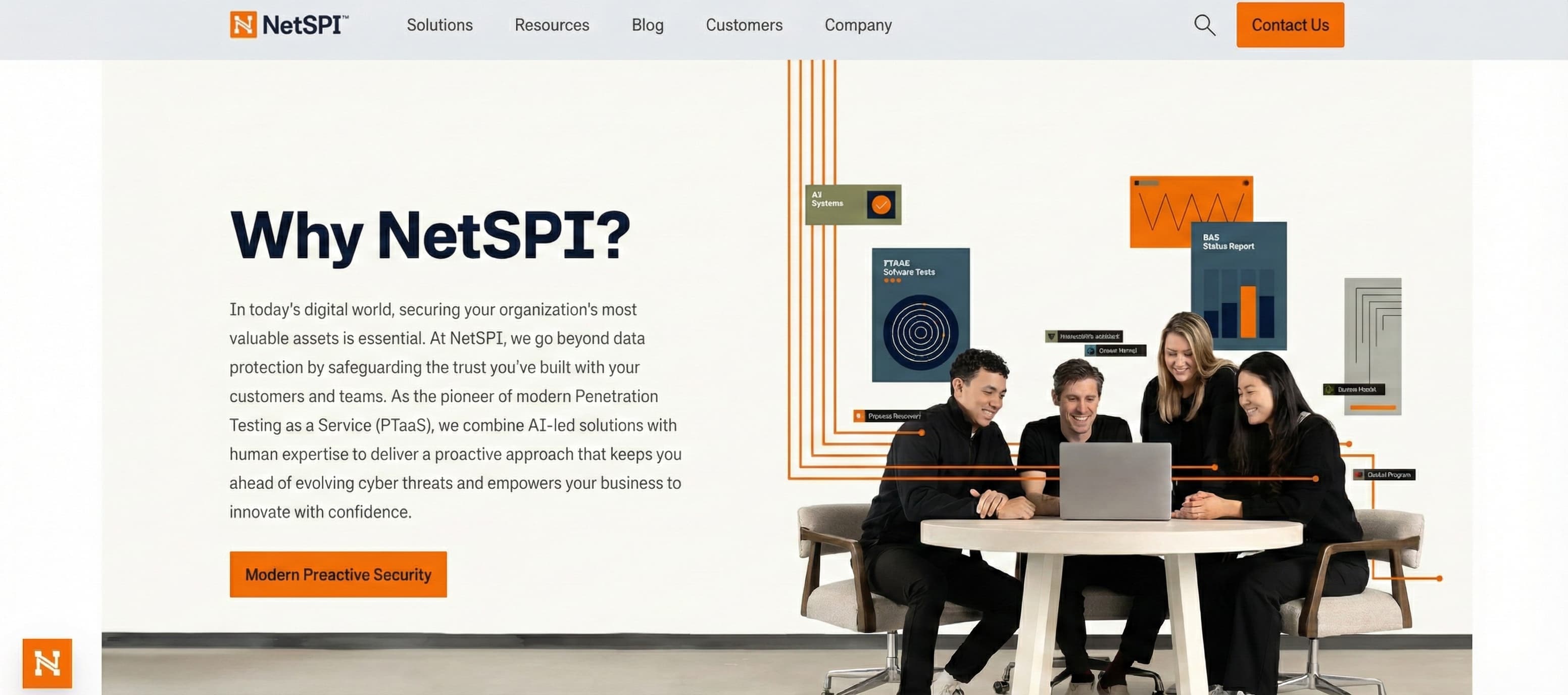
Why They Stand Out: NetSPI has made a name as a leader in technology powered, human delivered pentesting. They’ve heavily invested in their PTaaS platform Resolve, which acts as a centralized hub for clients to schedule tests, view results, and track remediation. This platform approach allows for easier scaling and integration into clients’ workflows DevOps pipelines, ticketing systems. However, unlike some pure software PTaaS offerings, NetSPI’s tests are conducted by their team of skilled testers the platform is there to streamline and provide transparency, not to replace human hacking. NetSPI’s ability to handle large volumes of testing say, dozens of apps across business units with consistency has made them popular with big enterprises. Notably, in 2023 NetSPI secured significant investment e.g., $410 million from KKR, which speaks to their growth and the market’s belief in their approach. They leverage this scale to offer specialized testing as well, such as for SAP systems or mainframes, through dedicated practice groups. NetSPI is also known for its strong client retention, likely due to their emphasis on building long term testing programs rather than one off projects. For organizations that want a strategic pentesting partner who can grow with them and provide continuous value, NetSPI fits the bill.
Key Strengths:
Potential Limitations: Because NetSPI caters to larger organizations, smaller companies or startups might find their services less accessible either due to scale or cost. NetSPI typically pursues multi-test engagements and longer term contracts; if you just need a single small pentest, a boutique firm might be more flexible. Another consideration is that the use of a platform, while beneficial to most, might not appeal to those who prefer very interpersonal, high touch consulting without logging into a portal. Some security teams like raw interactions and emails; NetSPI will certainly communicate personally, but they will also expect you to engage with their platform for the full benefit. Additionally, NetSPI’s methodology, while robust, is standardized to ensure consistency on rare occasions, extremely unconventional environments might require more of a researcher mindset than a methodical approach. In such niche cases, a smaller specialist firm might outperform by thinking entirely out of the box. However, NetSPI often mitigates this by hiring and retaining top talent who can handle edge cases too.
Best For: Large and medium enterprises that want a reliable, programmatic approach to penetration testing. If your organization is looking to integrate pentesting into the development lifecycle or do rolling assessments across many assets, NetSPI is an excellent choice. They are ideal for companies that appreciate a blend of technology and service for example, a financial institution that needs dozens of applications tested and tracked, or a healthcare company that must ensure continuous compliance across a changing environment. NetSPI is also great for organizations aiming to mature from ad hoc testing to a structured testing program with metrics and continuous improvement. In essence, choose NetSPI if you seek a scalable pentesting partner with a modern delivery approach.
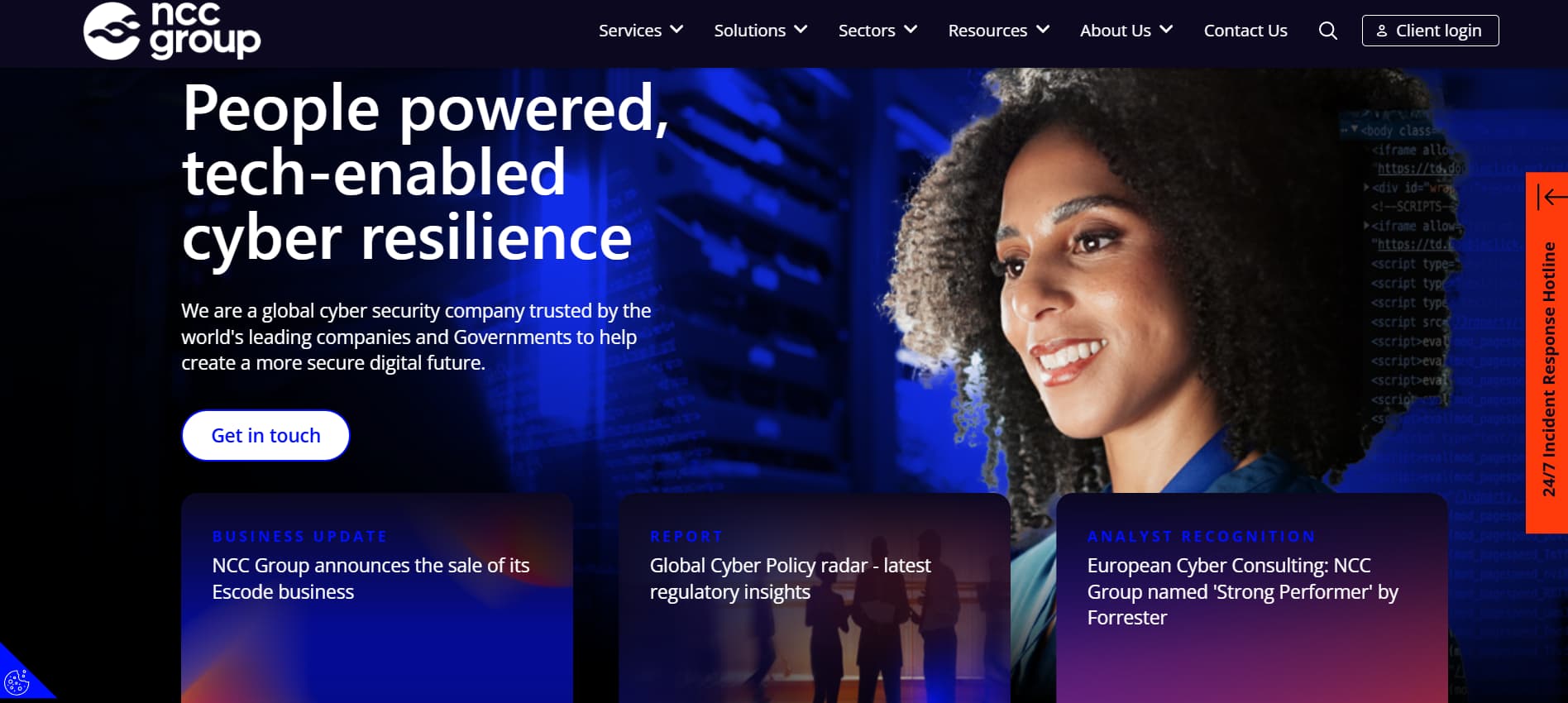
Why They Stand Out: NCC Group is a powerhouse in the security consulting world, particularly known in Europe but with global influence. For penetration testing specifically, NCC Group has one of the largest teams of testers worldwide, many of whom are recognized experts. They are a CREST certified company and even help set industry standards. The sheer breadth of their experience means they’ve likely seen every technology and every kind of vulnerability this helps in finding issues quickly and knowing where to look. NCC Group also frequently publishes advisories and technical write ups from their research they have dedicated research teams that discovered high profile vulnerabilities. Another aspect is their ability to offer end to end services: a client could engage NCC for a pentest and if something critical is found, rely on their incident response for deeper analysis, or use their advisory services for risk management. This integrated offering appeals to organizations that want to consolidate vendors. Moreover, NCC’s global footprint means they can handle local requirements like UK’s CHECK scheme for government pentests, for which NCC is accredited. They also have specialized teams for emerging areas for instance, they acquired firms specializing in automotive security, maritime security, etc., and absorbed that expertise. If you want a one stop global expert, NCC Group is often in the conversation.
Key Strengths:
Potential Limitations: As a large firm, NCC Group’s services usually come at a premium and with more formal processes. Smaller organizations might find the sales and onboarding process a bit too enterprise oriented. NCC may also rotate team members on long projects, which can introduce learning curves though they manage knowledge transfer well. Another downside sometimes noted is that highly creative out of the box findings the kind of quirky issues a boutique researcher might find can occasionally be missed if the engagement sticks too rigidly to standardized testing approaches. However, NCC usually encourages creativity within its teams to avoid this. Also, because they offer so many services, clients need to ensure their pentesting needs get adequate focus and aren’t upsold into other services unless they want them. It’s not that NCC Group aggressively pushes extras, but a broad portfolio sometimes means multiple teams involved, which could complicate communication if not managed properly.
Best For: Organizations that want a top tier, established partner with global capabilities. NCC Group is especially suitable for large enterprises, financial institutions, or government bodies that require the assurance of a big name firm with extensive resources. If your company operates internationally and needs consistent testing quality in different regions, NCC is a strong candidate. It’s also a great choice when you have a mix of needs say you need pentesting now, but might need incident response or security strategy consulting later; NCC can cover it all, providing continuity. In short, choose NCC Group if you value breadth, experience, and a proven track record they are the veteran that likely has seen and done it before, which can be very reassuring when navigating modern cyber risks.
Comparison Table of Top Penetration Testing Companies 2026
| Company | Specialization | Best For | Region | Compliance Focus | Ideal Client Size |
|---|---|---|---|---|---|
| DeepStrike | Manual pentesting & PTaaS cloud, app, API | Overall security partner balanced expertise and flexibility | Global USA HQ | Emphasizes real security; maps to standards OSCP certified team | Mid size to Enterprise |
| Bishop Fox | Continuous testing platform + expert red teaming | Large enterprises needing ongoing testing | Global USA HQ | CREST certified; compliance as outcome of strong testing | Enterprise Fortune 1000 |
| BHIS | Knowledge transfer pentesting live collaboration | SMBs & mid market wanting educational engagement | Primarily North America remote global | Aligns with compliance naturally, not primary focus | Small to Mid size |
| Coalfire | Compliance driven pentesting cloud, FedRAMP, PCI | Regulated industries, cloud/SaaS providers | North America focus global delivery | FedRAMP 3PAO, PCI QSA, ISO 27001 | Mid size to Enterprise |
| SpecterOps | Adversary simulation & identity security | Advanced security orgs APT simulation | Global USA HQ | CREST accredited; FedRAMP High product | Large Enterprise / Govt |
| IOActive | Hardware, IoT, automotive security testing | Product manufacturers, critical infrastructure | Global USA & international labs | Follows industry safety standards UL, etc. | Enterprise / Tech Vendors |
| NetSPI | Scalable PTaaS with human experts | Enterprises with high testing volume | Global USA HQ | Follows OWASP, NIST; provides compliance reports SOC2, etc. | Enterprise Fortune 500 |
| NCC Group | Broad security consulting large pentest team | Organizations needing one stop global provider | Global UK HQ | CREST, CHECK, PCI, many standards | Enterprise / Government |
| TrustedSec | Social engineering & expert led testing | Firms seeking security thought leaders | Global USA HQ | CREST certified; contributes to standards PTES | Mid size to Enterprise |
| Synack | Crowdsourced PTaaS platform global researchers | Continuous testing with diverse talent | Global USA HQ | SOC 2 Type II; compliance friendly platform | Enterprise Tech, Finance |
One important consideration in choosing a penetration testing company is whether to go with a large provider or a smaller boutique firm. Enterprises and SMBs have different needs and might benefit from different types of providers. Here’s a breakdown to help you decide which is right for your organization:
When Large Firms Make Sense: If you’re a global enterprise with a broad attack surface, multiple concurrent projects, and strict compliance demands, a larger firm like NCC Group or Bishop Fox can offer the capacity and range you need. These providers have extensive resources they can spin up multiple testing teams to hit tight deadlines and cover diverse technologies in parallel. They also tend to have well established processes and reporting suitable for formal audit requirements and executive consumption. Large firms can often support multi year engagements, providing continuity as your business grows. They might also have additional services incident response, advisory that an enterprise can leverage as a one stop shop. For a Fortune 500 company with mature processes, the credibility and scale of a big name firm can also satisfy due diligence for stakeholders. Additionally, big providers usually carry substantial insurance and legal frameworks which large enterprises often require.
When Boutique Firms Outperform: Smaller or boutique pentesting firms like BHIS, TrustedSec, or DeepStrike often punch above their weight in expertise and service. If you value a highly customized approach, direct access to senior experts, and flexibility, boutiques are extremely compelling. SMBs, in particular, benefit from the personal touch: the testing team you meet during scoping will likely be the ones doing the work, and they’ll tailor their approach to your specific environment rather than follow a rigid template. Boutiques can also be more agile scheduling may be faster, and they can adapt on the fly if you need to change scope or dig deeper into a discovered issue. For organizations that have niche needs or want the absolute top specialist in a given area, a boutique is often founded or staffed by those niche experts. For example, if you run a crypto exchange and want a security review, a smaller firm that specializes in blockchain security could provide more insight than a generic big firm. In short, boutiques excel at deep expertise, creativity, and client focus, which can result in a more meaningful test especially for unique environments.
Cost vs Value Trade offs: Budget is a reality in this decision. Large firms typically have higher rates, reflecting their overhead and brand prestige. However, they might accomplish more in a fixed time due to having bigger teams and refined methods so the value can still be there if you fully utilize their capabilities. Boutiques might be more cost effective for smaller scopes no paying for fancy offices or massive sales teams, and they often work with you to maximize value by focusing on your biggest risks. Be cautious of extremely low cost providers often very small or new firms if a quote seems much lower than others, ensure it’s not just a vulnerability scan or a shallow test. That said, many boutiques deliver high value per dollar by focusing on impact and avoiding unnecessary process frills.
Risk Tolerance and Trust: Enterprise security leaders sometimes feel safer with a large firm because there’s a perceived lower risk: established reputation, lots of resources if something goes wrong, and formal contracts. SMBs might lean towards boutiques because trust is built person to person you know exactly who is testing your systems. It’s worth noting that both large and small reputable firms maintain strict confidentiality and professionalism. If your risk tolerance is low say you’re a bank worried about any data exposure, you might opt for a well known firm with decades of track record. Conversely, if your priority is to uncover as much as possible and you’re willing to take input from a more unconventional source, a boutique or even a crowdsourced platform like Synack leveraging vetted freelance researchers globally can yield great results by exposing you to diverse attacker mindsets.
Mix and Match Strategy: Many organizations actually use a combination: perhaps a big firm for annual compliance tests to satisfy auditors and execs, and a boutique for more frequent or specialized testing to dig into areas the annual test didn’t cover deeply. Others use crowdsourced testing platforms for continuous coverage and a consulting firm for high level engagements. This layered approach can offer the best of both worlds broad coverage plus deep dives. The key is to manage knowledge transfer and avoid gaps or overlaps.
There’s no one size fits all answer. Enterprises should not automatically dismiss boutiques, and SMBs shouldn’t assume big firms are out of reach. Focus on the criteria that matter to you: scope, expertise, relationship, budget. If you need breadth, scalability, and a one stop partner, lean towards a larger firm. If you need highly specialized skills, personal service, or maximum value on a limited budget, a boutique may be better. Ultimately, a provider’s ability to meet your specific goals and integrate with your team is more important than their size.
Remember that the best penetration testing provider is the one that becomes a trusted advisor for your organization’s security journey whether that’s a team of 10 or 1000, what matters is the results they deliver and the confidence they instill.
The cost of penetration testing can vary widely based on scope, depth, and provider. A small engagement like testing a simple web app or a small network segment might start around a few thousand dollars, whereas an in-depth assessment of a large enterprise multiple networks, dozens of applications, Red Team exercises can run into the tens or even hundreds of thousands. Boutique firms often charge by the project or week, while larger firms may have day rates per consultant. As a rough guideline, many reputable providers fall in the range of $1,000 to $1,500 per consultant per day. So a two week test with two consultants could be around $20k–$30k. Keep in mind, higher complexity cloud environments, IoT devices or specialized skills hardware, advanced Red Teaming will increase cost. When evaluating cost, focus on the value and outcomes: a more expensive test that finds serious issues and provides strong remediation guidance is worth more than a cheap test that misses critical vulnerabilities. Always obtain a detailed scope document this helps ensure quotes are comparable. Lastly, consider the cost of not testing: breaches or compliance failures are almost always far more expensive than a quality pentest.
In general, yes the expertise often evidenced by certifications of the testers is more important than whatever fancy tools a firm uses. Certifications like OSCP, OSCE, CISSP, CREST, GIAC, etc., indicate a level of knowledge and commitment to the field. They show that the tester understands methodologies and can think critically. Tools, on the other hand, are just aids automated scanners, exploitation frameworks, and so on. Every decent firm will use tools commercial or open source to automate parts of the job, but tools have limitations. It’s the tester’s skill that finds the vulnerabilities the tools miss or chains findings into an impactful exploit. That said, certifications are not the only marker of skill many top notch testers have learned through experience or contribute to the community without chasing certs. So, look at the overall caliber of the team: Do they speak at conferences? Publish research? Have years of diverse experience? Providers touting proprietary AI powered tools without mentioning the humans behind them should be approached with caution. The best scenario is a firm with certified, experienced humans who wisely use tools to enhance their manual testing efficiency.
The duration of a penetration test depends on the scope and depth of testing. A straightforward test of a single web application might take 1–2 weeks. A comprehensive network pentest covering many IPs or segments often takes 2–4 weeks. Red Team operations, which are simulation of real attacks, might run anywhere from 4 to 8 weeks sometimes with periods of monitoring in between. For complex environments e.g., a mix of cloud, on prem, multiple apps, and an active directory domain, expect multi week engagements or separate tests scheduled over a few months. Timelines also include time for planning and scoping at the start and report writing at the end. One approach some companies use is to break testing into phases for example, do an external network test in January 2 weeks, an internal test in February 2 weeks, etc., rather than one massive engagement. This can allow remediation in between. When planning, also factor in lead time; many top firms have waiting lists, so booking 1 3 months in advance is common. Remember, a rush job is not ideal in security testing thoroughness is key, so be suspicious of anyone promising to do an extensive pentest in just a couple of days.
A high quality penetration test report is a critical deliverable. You should expect: 1 Executive Summary: a high level overview in plain language for leadership, summarizing the overall security posture, number of findings, and key business impacts. This often includes risk ratings or a letter grade. 2 Technical Findings: detailed descriptions of each vulnerability found, typically categorized by severity High/Medium/Low or Critical/etc.. Each finding should have: a description of the issue, steps to reproduce so you can validate it, the impact of the vulnerability what an attacker could do, and importantly, recommendations for remediation how to fix or mitigate it. Many reports also include screenshots or proof of concept code for clarity. 3 Methodology: a section describing how the test was conducted tools and techniques used, scope covered, what was out of scope. This lends credibility and helps future testers. 4 Appendices: possibly raw output for reference, or details like user accounts tested, IPs, etc., depending on the engagement. During the project, you should also expect interim updates or immediate alerts on any critical issues good firms won’t wait until the final report to tell you about a serious hole they’ll inform you right away so you can start fixing. Finally, a report should be delivered in a secure manner and followed by a debrief meeting where the testers walk through findings and answer questions. If any of these elements are missing, that’s a red flag.
Penetration testing is not a one and done exercise. The threat landscape and your IT environment both change rapidly. A common baseline is to do a full scope pentest annually at minimum. However, there are several factors that might necessitate more frequent testing: Major changes if you deploy a new critical application or infrastructure, test it before and after launch. Regulatory requirements some standards like PCI DSS require at least annual tests, and after significant changes. Continuous Integration if you’re in a DevOps environment pushing frequent updates, you might consider more frequent e.g., quarterly or monthly app testing or utilize PTaaS for ongoing assessments. Emerging threats if there’s a new exploit say, a critical vulnerability in a system you use, conducting an ad hoc test focusing on that risk is wise. Also, consider alternating types of tests: one year an all out Red Team, the next year a focused cloud security assessment, etc., to get different perspectives. Increasingly, companies are moving to a model of continuous testing, either through an internal team or services that provide regular testing and validation of fixes this addresses the fact that new credential stuffing attack patterns and exploits appear throughout the year, not neatly on schedule. In summary: do a thorough pentest at least yearly, and adjust frequency based on changes and risk appetite. Remember, frequent smaller tests can sometimes catch issues early and are easier to budget for, versus one huge test that might drop hundreds of findings on you at once.
This is a crucial distinction for buyers. A vulnerability scan is an automated, high level process that identifies known issues. It’s typically done with tools that compare system settings or software versions against databases of known vulnerabilities like missing patches or misconfigurations. Scanners will produce a report of potential vulnerabilities, often with many false positives or low impact informational findings. They do not exploit the issues; they just flag them. In contrast, a penetration test is performed by skilled humans often using scanning tools as a starting point who actively try to exploit weaknesses and bypass security controls. A pentester will validate if a vulnerability is real and determine what it actually means for your security by doing things like stealing data, escalating privileges, or pivoting within your network safely and with permission. The result is typically fewer findings than a vuln scan but of far higher significance, all manually verified. Think of it this way: a vulnerability scan might tell you these 100 servers are missing patches. A penetration test might use one unpatched server to gain admin access, then use those credentials to access an HR database and extract salaries something a scanner alone can’t do. Both have their place: vulnerability scanning is good for regular check ups and compliance, whereas penetration testing is the deep dive that shows you how an attacker would actually breach your defenses. Be wary of anyone trying to sell a vulnerability scan as a pentest if the price is very low and no human expertise is described, it’s likely just an automated scan.
Selecting a penetration testing company is a significant decision, but armed with the right information and criteria, you can approach it with confidence. In this guide, we’ve taken an unbiased, research driven look at the top pentesting providers in 2026, spanning global powerhouses to highly specialized boutiques. The common thread among all these companies is that they have demonstrated excellence in simulating real world attacks and guiding organizations to better security.
A few key takeaways as we conclude: First, no single provider is best for every organization each has strengths suited to particular needs. It’s important to honestly assess your environment, risk profile, and culture to find a good fit. Second, focus on the fundamentals: the expertise of the testers, the quality of their methodology and reporting, and their commitment to your success beyond just the test itself. Third, maintain a mindset of partnership. The most successful penetration testing engagements are those where the provider is treated as a trusted advisor helping you improve, not just an auditor ticking a box.
We’ve emphasized neutrality in these rankings aside from our own inclusion with a transparent note, the evaluations are based purely on merit and publicly verifiable information. The goal is to empower you, the buyer, to make an informed choice grounded in expert knowledge and industry insight. Whether you prioritize a firm that will deeply challenge your dev team’s assumptions, or one that will ensure you meet every compliance requirement, this list offers a starting point for your due diligence.
The threat landscape in 2026 continues to evolve rapidly, with attackers leveraging automation, cloud complexity, and even AI to find new weaknesses. In response, the penetration testing industry has matured with providers offering innovative approaches like continuous testing and attack path management. But at its core, this remains a human driven field where experience, creativity, and integrity make the difference. All the companies listed here bring those qualities to the table in different measures.
In closing, remember that a penetration test is not a silver bullet or a one time fix. It’s an ongoing practice in a holistic security strategy. The right provider will help you not just find vulnerabilities, but also build resilience teaching your team, informing your security investments, and contributing to a culture of proactive defense. We hope this ranking and guide has brought clarity to your search and given you a framework to move forward. Stay objective, demand excellence, and your choice of provider will serve you well in strengthening your cyber defenses.
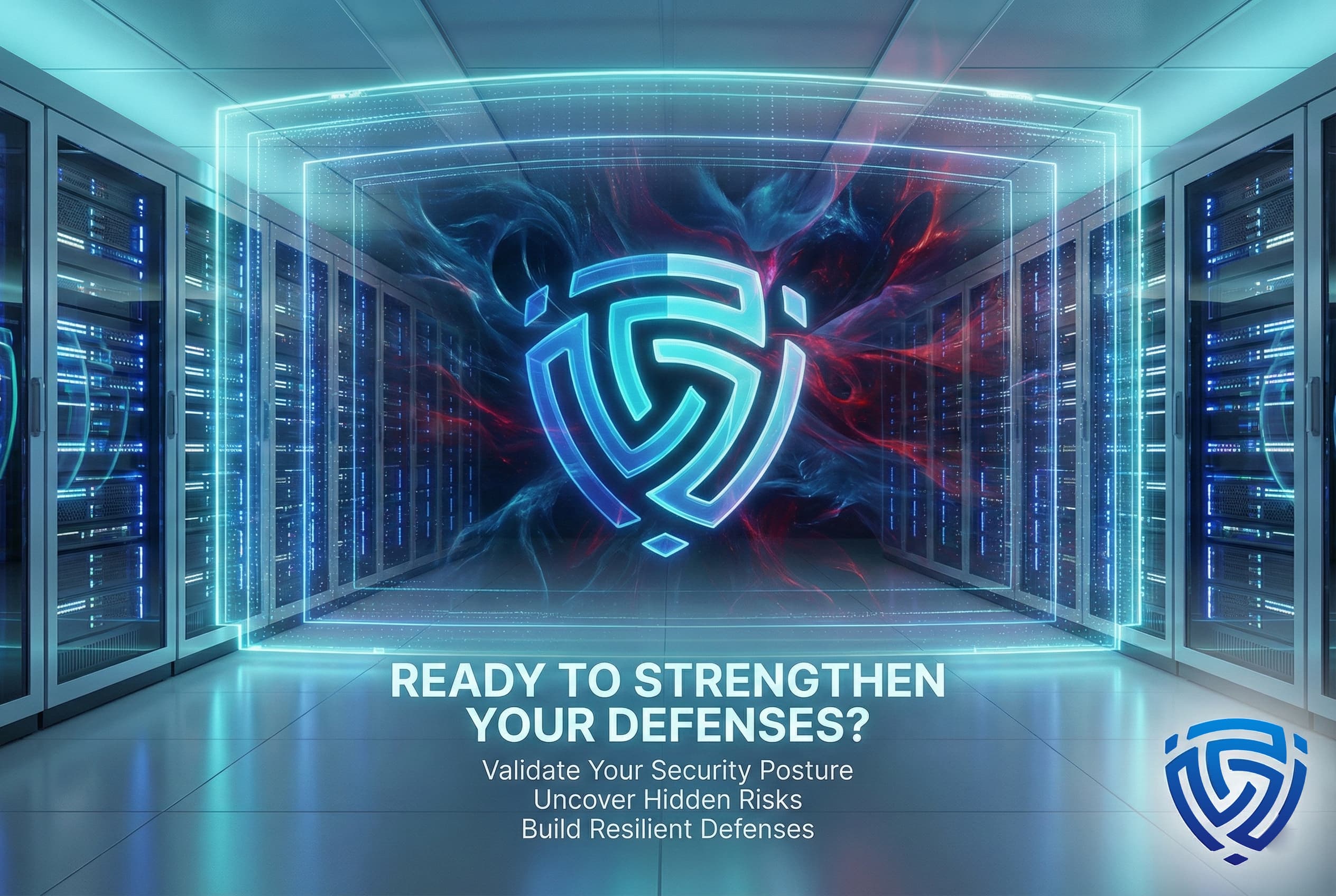
Ready to Strengthen Your Defenses? The threats of 2026 demand more than just awareness; they require readiness. If you're looking to validate your security posture, identify hidden risks, or build a resilient defense strategy, DeepStrike is here to help. Our team of practitioners provides clear, actionable guidance to protect your business. Explore our Penetration Testing Services to see how we can uncover vulnerabilities before attackers do. Drop us a line, we’re always ready to dive in.
About the Author: Mohammed Khalil is a Cybersecurity Architect at DeepStrike, specializing in advanced penetration testing and offensive security operations. With certifications including CISSP, OSCP, and OSWE, he has led numerous red team engagements for Fortune 500 companies, focusing on cloud security, application vulnerabilities, and adversary emulation. His work involves dissecting complex attack chains and developing resilient defense strategies for clients in the finance, healthcare, and technology sectors.

Stay secure with DeepStrike penetration testing services. Reach out for a quote or customized technical proposal today
Contact Us